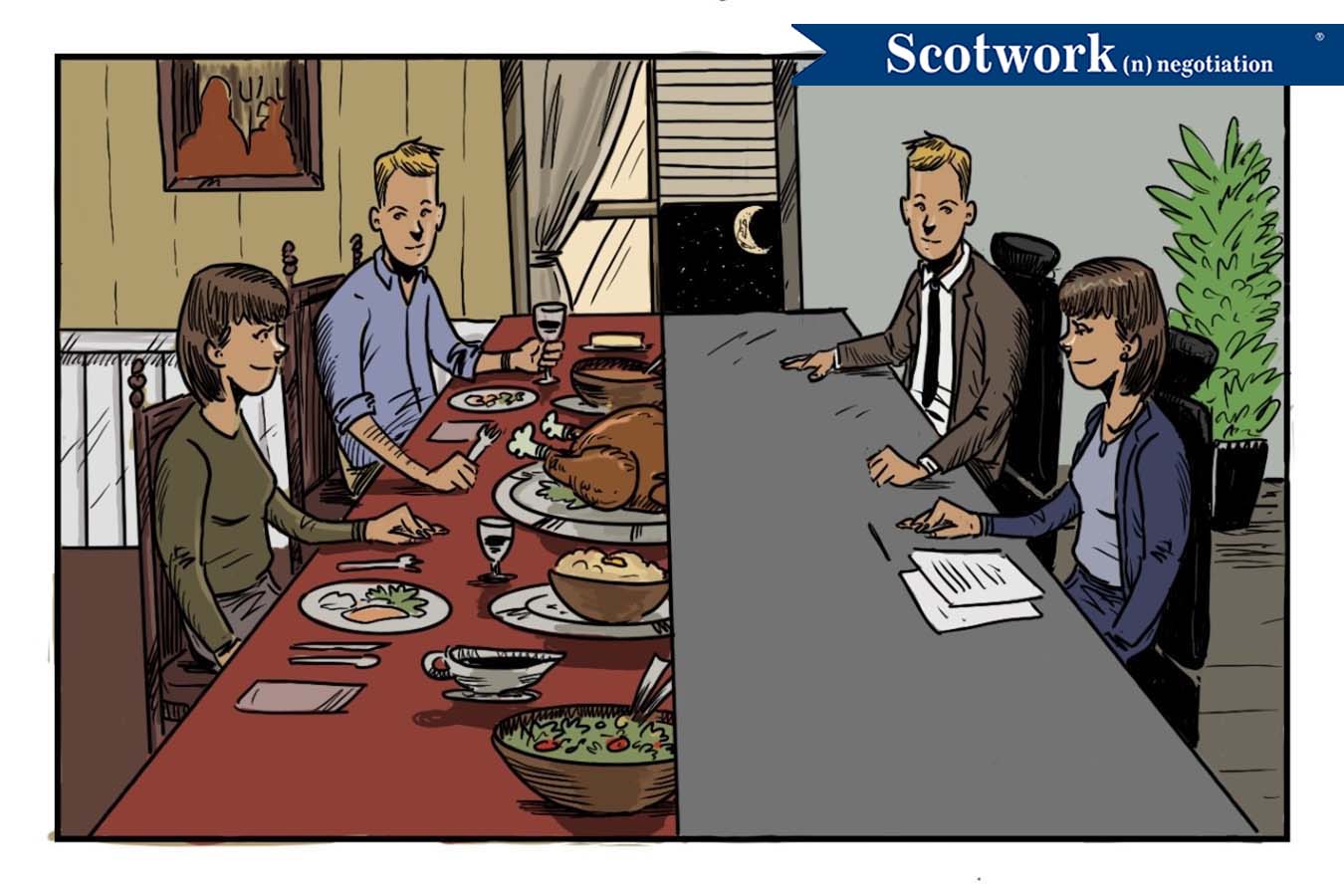Are you ready for Thanksgiving? I’m not talking about the turkey and sides; I’m talking about are you ready for your guests? As I searched for menu ideas, I also came across a lot of advice on how to survive Thanksgiving! The stress of the holidays can bring out some interesting behaviors — much like the stress of negotiating can bring out interesting behaviors in negotiators. As I read the articles and research on surviving Thanksgiving (and there was a lot!), I found five tips from the negotiating table that can help make our time at the Thanksgiving dinner table more enjoyable.
Tip #1: Reciprocity goes a long way.
Sociologists Phillip Kunz and Michael Woolcott conducted a Christmas card experiment. The short version is, they sent out more than 500 cards to total strangers to see how they would respond. The results were shocking: Almost 200 people responded by sending cards back to these total strangers! This is a great example of reciprocity: People tend to return the treatment they’ve received from others.
At the Thanksgiving table or the negotiating table, follow the golden rule: treat others the same way you would want to be treated yourself. Basically, lead by example. In most cases, your guests will reciprocate, giving back to you what you’ve given to them.
Tip #2: It’s OK to make it out of bounds.
There are times at the negotiating table when certain issues are out of bounds and not negotiable. It’s best to let the other party know this sooner rather than later so that neither of you wastes time arguing over issues that will not change. The same approach can be applied at the Thanksgiving dinner table.
Not every topic needs to be discussed on Thanksgiving! It’s totally acceptable to make clear to your guests that certain topics are out of bounds on this day. You might do this for politics, parenting advice, or anything else that could lead to unnecessary conflict. If your guests won’t follow the rules, there’s nothing wrong with removing yourself from the conversation before your limits get tested.
Tip #3: Not every problem needs to be solved.
During any negotiation, both sides will reveal problems or obstacles that they’re dealing with. It can be tempting to try to solve those problems. However, problem-solving requires two elements. The first is a mutual interest in solving the problem. The second is that both parties need to see the problem in the same manner. If either or both elements are missing, no amount of problem-solving will lead to solutions.
While sitting around the Thanksgiving table, you may hear someone talk about a problem or an issue to which you think you have an easy solution. Instead of trying to solve their problem, consider keeping your solution to yourself, unless they ask you for help. Otherwise, you’re potentially opening yourself up to unwanted rebukes and unnecessary conflict.
Tip #4: It’s not all about you.
One of the most common mistakes negotiators make is focusing only on themselves and not taking the other side into consideration. They fail to find out what’s important to the other side and, therefore, have no idea how to use their leverage. They don’t test assumptions and often run into avoidable obstacles. Their proposals are one-sided and usually rejected. The net result is a lot of wasted time and lackluster outcomes — all of which could be avoided by just being a little less self-absorbed.
At Thanksgiving, it’s quite possible that someone is going to say something that will bug you or you won’t agree with. Instead of arguing to win, try a different approach: seek to understand. Another way to de-escalate the tension is to underreact to what’s said. Assume good intentions and try not to take it personally — it’s not all about you.
Tip #5: Keep the bigger picture in mind.
It’s easy to go down a rabbit hole during a negotiation. We can get sidetracked by minor issues and other minutiae. We can get caught up in personality conflicts or procedural issues. A skilled negotiator does not let these distractions derail a negotiation. They stay focused on the bigger picture.
There’s a reason why we bring family and friends together for Thanksgiving. It’s an opportunity for us to be grateful for one another and reminded of our love for each other. So, if things start to go awry with your guests, keep the bigger picture in mind — be grateful that you’re surrounded by the people you love.
We Can Help You Deal With Stress at the Negotiating Table.
The stress of negotiating can bring out interesting behaviors in negotiators. They can get sidetracked by minor issues and other minutiae. They can get caught up in personality conflicts or procedural issues — all while losing sight of the bigger picture. We can help! Drawing on nearly 50 years of real-world negotiating experience, we’ll assist you with getting better deals, saving time, and creating value for all involved — not to mention preserving and even strengthening relationships. Let us partner you with one of our advisers, ensuring that you’ve got the broadest view of your deal.
Talk to one of our experts today.

